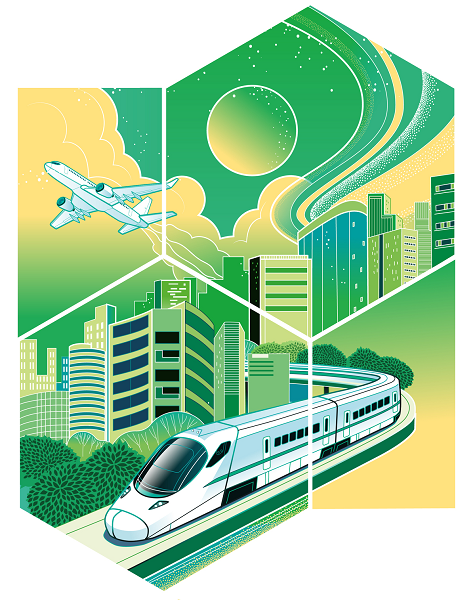BRI projects can help global recovery
The global economy is in recession. It needs inclusive growth to recover. And the Belt and Road Initiative is a successful example of inclusive growth.
The COVID-19 pandemic has brought about major changes around the world, subverting — or reshaping — many international consensuses. The pandemic is the third major event that has changed the global agenda this century, the first two being the Sept. 11, 2001, terrorist attacks on the United States and the 2008 global financial crisis. Among the other major developments that have impacted the world since 2017 are the trade war launched by the United States and Brexit.

Public health crises have always been a severe challenge for society, as people's health is a top priority for all countries. Due to the COVID-19 pandemic, millions of people have lost their jobs, and many children have either dropped out of or can't attend school, leading to psychological trauma. An International Labour Organization report says more than one-sixth of the young people worldwide have lost their jobs, and 42 percent of those still employed have had their pay cut.
The situation seems to be particularly bad in developing countries. And most of the countries along the Belt and Road are developing ones and faced public health challenges even before the pandemic broke out. Statistics show that only 3 percent of medicines in Africa are produced locally, and 70 percent of the world's population lacks adequate medical services. So cooperation in public healthcare is regarded as a fundamental task of the Belt and Road Initiative.
Which makes developing a "Silk Road of Health" and building a community of shared health for humankind imperative. The immediate priority should be to stop the spread of the virus and safeguard public health around the world. And since in the post-epidemic era, the need for global and regional cooperation in this field will increase sharply, there is a need to accelerate the construction of public health infrastructure, and make the global public health system more effective and sustainable under the framework of Silk Road for Health.
It is necessary to fully mobilize enterprises in all countries to lend a hand in building a shared community of health, and further strengthen international cooperation in fighting infectious diseases, improving maternal and child health, and developing vaccines. We also need to provide more public health goods including health education and personnel training.
The epidemic has prompted many Belt and Road countries to turn more inward, which has reduced demand for infrastructure, trade, and investment. Orders for many industrial parks in the Belt and Road countries have reduced sharply, making it more difficult for them to attract investment. And many companies have switched to producing pharmaceutical products. As for financial support, global capital is generally constrained, and international financial institutions are investing with added caution. Compounding the situation are the efforts of some Western countries to "reshore" their industries and decouple their economies from the wider global economy, creating more and more problems for developing countries.
It is also necessary to build a "Digital Silk Road" to help the developing economies to recover faster by, among other things, strengthening macroeconomic policy coordination and facilitating orderly resumption of work and production. Governments, on their part, should focus more on cooperation in sectors such as digital economy and the pharmaceutical industry, while strengthening food security, creating new growth points in the fields of e-commerce, smart cities, artificial intelligence and big data, and striving to narrow the digital divide.
The global economy is in recession. It needs inclusive growth to recover. And the Belt and Road Initiative is a successful example of inclusive growth. Essentially, the initiative is aimed at generating new demand, and rebalancing the world economy by increasing effective supply.
The pandemic has also affected social psychology and ideologies, making the existing imbalances in the international trading system even more obvious. So the Belt and Road project should have a strategic focus, especially because Belt and Road countries hope to boost their own development through global cooperation.
Measures should also be taken to raise the development standards, align with sustainable goals, and improve people's livelihoods. In order to ensure that maximum number of people benefit from the projects and make public health resources accessible to Belt and Road countries, China could consider establishing pharmacies named after Li Shizhen (legendary Chinese pharmacist in the 16th century) and hospitals in the name of Hua Tuo (Chinese physician and surgeon in the 2nd-3rd centuries) on the lines of Confucius Institutes and Lu Ban Workshops.
China should also emphasize the role of production capacity cooperation, so as to help put developing countries on the road to industrialization and modernization. Many Belt and Road countries have accorded priority to agriculture and lack public healthcare facilities, making it all the more important to strengthen the construction of parks for agricultural industries and pharmaceutical companies, and to deepen cooperation in sectors such as food production and processing, agricultural products, and medicine and healthcare.
After the pandemic is contained, Belt and Road cooperation will thrive with new vitality, and help improve global governance with the aim of building a community with a shared future for mankind.
The author is Zhao Lei, director of the Institute of International Relations and Belt and Road, International Strategic Research Institute, Party School of the CPC Central Committee.

